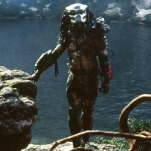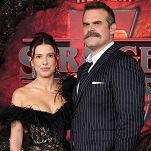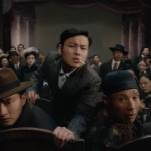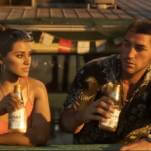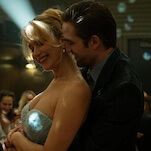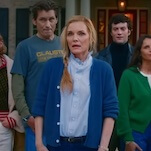The Man Without A Past

A shaggy-dog story in more ways than one, Finnish director Aki Kaurismäki's loose-limbed existential comedy The Man Without A Past champions the drifters, bums, and outcasts that wind up deposited like refuse in a Helsinski squatters' camp. With a loping, deadpan style that falls somewhere between Buster Keaton and Jim Jarmusch, Kaurismäki follows an amnesiac who carves out a cozy new existence at the bottom rung, casually improvising an identity as he goes along. His modest adventures unfold with a complete lack of affect, yet beyond the poker faces of the characters and the filmmaker exist deep reserves of feeling, a glint of spirit among the seemingly lifeless. In the past, Kaurismäki's work has received spotty U.S. distribution at best, with 1989's determinedly quirky Leningrad Cowboys Go America making perhaps the largest impression. But that film's glib hipsterism doesn't begin to suggest the subtle rhythms of The Man Without A Past, which quietly asserts its eccentric romanticism with an assured, matter-of-fact blend of humor and pathos. Leading a cast that could never be mistaken for movie stars, Markku Peltola plays a gangly, chain-smoking greaser who's hospitalized after bat-wielding thugs take his possessions and leave him for dead. After doctors give up on him, Peltola miraculously recovers and rises from his bed in mummy's rags, setting off into Helsinki without the slightest knowledge of who he is or where he's going. In one of the many selfless acts scattered throughout the film, a poor night watchman (Juhani Niemelä) and his family welcome Peltola into their rusted-metal trailer until he's nursed back to health. Taking residence in a seaside shanty, he finds donated clothes and a few odd jobs at the local Salvation Army, where he charms a middle-aged lonelyheart (Kaurismäki regular Kati Outinen), who appears to have given up on love, if not life. Though the premise seems ripe for blunt social commentary and spoon-fed sentimentality, Kaurismäki stitches together his sad-sack community with such a disarmingly offbeat tone that the funniest and most touching moments seem to waft by without calling attention to themselves. As a slice-of-life, the film brims with memorable characters and subplots on the periphery, including a rent-a-cop (Sakari Kuosmanen) who fancies himself a slumlord and entrepreneur, a Salvation Army rock/R&B combo that plays to capacity hobo crowds, and a mopey attack dog named "Hannibal" who could be seen as a Kaurismäki stand-in. With droll humor and abiding warmth, The Man Without A Past celebrates the human capacity for goodness and generosity, but does so on its own idiosyncratic terms. To wit: After Pelota asks a stranger what he owes for jerry-rigging his electricity, the man replies, "If you see me face down in the gutter, turn me on my back."









